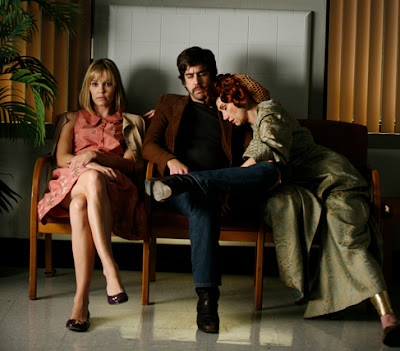Better than then recent "star"-heavy Robin Hood (shorter, too: this one's only 120 minutes compared to the earlier film's 140), IRONCLAD barely opened theatrically to dismissive reviews (eeeewwwww: too gory!) but should prove worthy of a large following on cable, DVD and streaming (the latter is how TM watched it, in High-Def, via Netflix). Directed with brawn and brains and co-written (with Erick Kastel) intelligently by Jonathan English (shown below), the movie is never less than interesting and often surprisingly riveting.
Mr. English is a fellow new to me, but who, on the basis of how well-put-together this movie is -- and the fact that, of the three films he has directed so far, each has risen higher than its predecessor in the IMDB ratings: the first received only a 1.5; the second garnered 3.5; and now Ironclad is up to 6.2 -- I would say that the filmmaker is learning on the job. His latest begins with the signing of the Magna Carta and then offers its own view of what that really bad King John got up to, post-MC. (Not nice, and it should call to mind the betrayal that ended Robin Hood, in which the excellent actor Oscar Issac essayed the role of "Prince" John.)
In any case, according to Ironclad (nice, descriptive one-word title, that!), when King John begins betraying what the Magna Carta stood for, those nobles who had forced the king to sign it now must see that he stands by it instead of executing (and rather nastily) all of them, one by one. To that end, a couple of Knights Templar rise to the occasion, and one of them (the sexy, tight-lipped James Purefoy, above, left, and below, in white skirt and red cross) then raises a (very small) army to stand against the King.
This little group (above) who number around a dozen (against what look like hundreds) eventually find themselves inside Rochester castle, where they are -- and how! -- besieged something fierce. This siege is the meat of the movie, and for the most part, it's a humdinger. Handled in a surprisingly believable and incident-specific manner, it becomes one of those sweet-Jesus: how much-more-can-they-take?! tales that keep viewers alert & on their trembling toes.
The cast -- surprisingly stellar (Paul Giamatti, above, plays King John, plus Brian Cox, Charles Dance, Derek Jacobi, Jason Flemyng, with Kate Mara, shown at bottom, as the somewhat unusual "love" interest) -- also proves very good, and the screenplay is full of nice, intelligent touches, such as the scene in which Purefoy recruits a soldier (Rhys Parry Jones, below) who must bid good-bye to his children. The fellow looks at his young son a moment, before saying, "Work hard," and then at his even younger daughter, to whom he advises, "Be polite."
The movie is no classic -- the screenplay is not good enough for that -- but it's suitably brawny (the battle scenes are excellent), and the performances lift it up a notch or two. When the two hours are through, you will feel as though you -- like those characters in that increasingly fragile castle -- have lived through something fierce. I'll certainly be interested to see what Mr. English does next.
Ironclad is available now on DVD, Blu-ray and via streaming.





















































